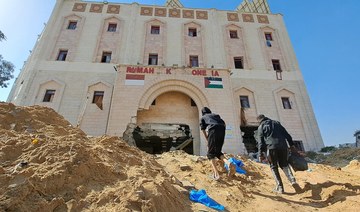LONDON: A UK submission of arguments at the international criminal court could delay a decision on the issuance of arrest warrants against the Israeli prime minister and defense minister for alleged war crimes in Gaza.
Judges at the ICC ruled on Thursday that the British government was allowed to submit legal arguments to judges mulling prosecutor Karim Khan’s request issued in May for arrest warrants for Benjamin Netanyahu and Yoav Gallant.
Court documents made public on Thursday showed that UK, as an ICC member state, filed a request with the court earlier this month to provide written observations on whether “the court can exercise jurisdiction over Israeli nationals, in circumstances where Palestine cannot exercise criminal jurisdiction over Israeli nationals (under) the Oslo Accords.”
The court already has an ongoing investigation, launched in 2021, into any alleged crimes within its jurisdiction committed on Palestinian territory and by Palestinians on the territory of Israel.
In the same year, judges ruled that the court did have jurisdiction after the Palestinian authorities signed up to the court in 2015, after being granted United Nations observer state status.
The decision, however, left a ruling on the interpretation of the 1993 Oslo Accords regarding Palestinian jurisdiction over Israeli nationals for a later stage in the proceedings.
The British argument is that the Palestinian authorities cannot have jurisdiction over Israeli nationals under the accords, and so it cannot transfer that jurisdiction over to the ICC to prosecute Israelis.
Experts told the Guardian newspaper on Friday that the decision to allow the UK to intervene on this issue might delay the arrest warrants case, though a former ICC official familiar with the 2021 case said the jurisdictional issues had been resolved and, if challenged, would be “dead on arrival.”
Mark Kersten, an ICC expert and criminal justice professor at the University of the Fraser Valley in Canada, said “it would beggar belief” if judges ruled Palestine “could not ask the court to address atrocities committed on its territories because of a moribund Oslo peace process.”
Danya Chaikel, an International Federation for Human Rights’ representative at the ICC, said Britain’s attempt to challenge ICC jurisdiction citing the Oslo accords was “deeply troubling and unjust.”
Clive Baldwin, a senior legal adviser at Human Rights Watch, also said the UK should not be “leading the charge for double standards in victims’ access to justice.”
A spokesperson for the Foreign Office said: “The UK believes that the court has not yet engaged with the impact and effect of the Oslo accords on jurisdiction in this case and we think it is imperative that they do so at any early stage of proceedings.”
* With Reuters


























